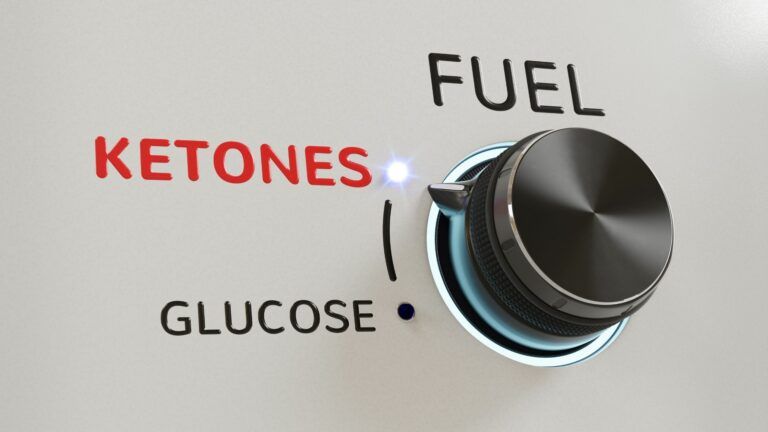Stop Cooking with Avocado Oil – Healthiest Cooking Oils Chart
The smoke point refers to the temperature at which an oil or fat starts to burn and smoke. It is often considered the most critical factor when choosing the best oil to cook with, but there are two other characteristics that are actually more important.
In this article we will have provided a complete cooking oils chart including fat profiles, smoke points, and recommended uses. We also offer suggestions on how to select the best oils for cooking and which specific brands we recommend.
What to Look For in a Healthy Cooking Oil
Many fats and oils are rich in vitamins and minerals, have antibacterial properties, and support hormone balance and other key functions, but certain oils should not be used for cooking, and some should be avoided altogether.
When selecting the best oil to cook with, there are three main characteristics to look for.
#1 Fatty Acid Profile
Saturated fats or oils are the most stable, meaning they don’t denature or degrade until they reach their smoke point. Some oils that contain predominately monounsaturated, or polyunsaturated (PUFA) fats, may have higher smoke points, however these types of fats actually break down or oxidize at much lower temperatures.
Oils don’t have to burn or smoke to go bad. Avocado oil for instance is often incorrectly recommended for high heat cooking due to its high smoke point (see below), however it contains predominately monounsaturated fats, which are less stable. Avocado oil should therefore only be used for moderate to low heat cooking, or added to foods cold.
#2 How the Oil is Made
Many oils that are recommended for cooking are already denatured and unhealthy before they are even heated due to the manner in which they are created. Heavily processed oils often contain hydrogenated or partially hydrogenated oils and man-made trans-fats. These types of oils degrade or oxidize very easily when exposed to light, air, or heat, and should not be consumed hot or cold.
As we have established, saturated fats are optimal for high heat cooking (>350 degrees). When selecting coconut or palm oil, choose organic unrefined forms, and when selecting animal-based oils such as ghee, tallow, lard, duck or chicken, choose pasture-raised, grass-fed, organic sources.
Predominately unsaturated fats from fruits (olives & avocados), seeds, or nuts are best for cold use. When selecting these types of oils, choose organic, extra-virgin, and cold-pressed forms whenever possible.
#3 The Smoke Point
The smoke point is the temperature at which proteins, minerals, enzymes, or other naturally occurring compounds in an oil begin to burn. Burning releases free radicals and a substance called acrolein which gives burnt fat its acrid smell. It is also extremely toxic if inhaled (smoke), or consumed. If your oil starts to smoke, through it out and start again
It should also be noted, that unrefined and refined versions of certain oils will have different smoke points.
Healthiest Cooking Oils Chart
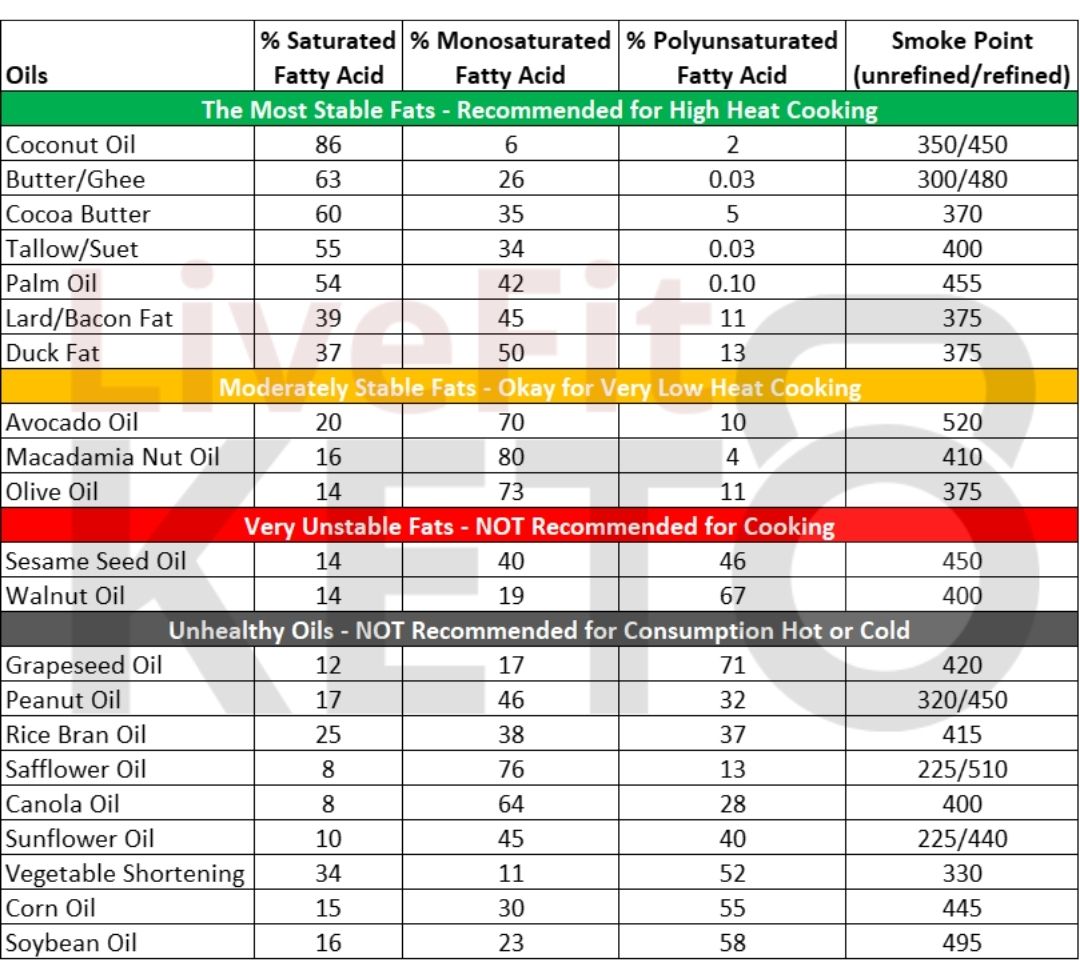
Selecting Quality Cooking Oils
Coconut Oil
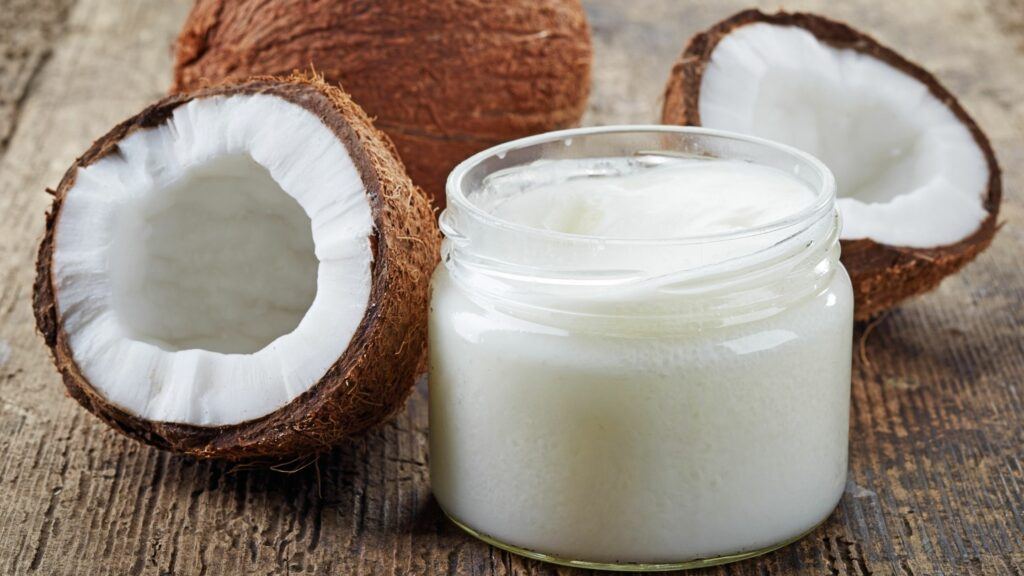
When it comes to coconut oil, there are a few things to consider. Although refined coconut oil has a higher smoke point, the refining process does remove some of the nutrients and taste. Depending on what you plan to use it for, you may want to consider having a refined option in stock specifically for higher heat cooking, and an unrefined version for everything else.
Virgin simply means unrefined, and extra-virgin is just a marketing label. The USDA doesn’t recognize the term “extra-virgin” with respect to coconut oil. Cold pressed or expeller pressed are important for oils high in certain antioxidants, but not as critical when it comes to coconut oil.
Organic generally means higher quality, but coconuts are not a high risk food for pesticides, so organic isn’t an absolute must. The best value for high quality coconut oil is the Kirkland tub of organic virgin coconut oil (cold pressed & unrefined), available at Costco or on Amazon.
Other quality unrefined coconut oil options include Now Foods, Viva Naturals, and Trader Joes (available in portable packets). Quality refined options include Nutiva and 365 Organic.
Butter or Ghee
Grass-fed and finished pasture raised butter or ghee offers the best nutrient profile and omega-3 to omega-6 ratio compared to other forms. For those that have difficulty digesting dairy, but want some of the health benefits, cultured ghee made using traditional methods is free of inflammatory milk sugars (lactose), and proteins (casein & whey).
There are however, differences in quality control among brands. Currently our go-to products are Pure Indian Foods Cultured Ghee, and Tin Star Foods Ghee. Both use cultured grass-fed butter, traditional heating and separation methods, and both conduct batch testing to ensure that their products contain less than 0.25% lactose and 2.5ppm casein/whey.
At these nearly undetectable levels, this ghee can be safely consumed, even by those with dairy sensitivities.
Cocoa Butter
Cocoa butter is simply the oil that is extracted from roasted cocoa beans during the process of making cocoa powder. Cocoa butter has several health benefits and is both consumed and applied externally as a skin moisturizer.
Since it is mostly made up of saturated fats, cocoa butter is quite stable and can tolerate moderate to high heat before denaturing or burning. It also may have a mild chocolate flavor, which makes it great for baking or spreading on baked goods.
Terrasoul Superfoods is our #1 brand for organic unrefined cocoa butter and cocoa powder.
Tallow, Lard & Duck Fat
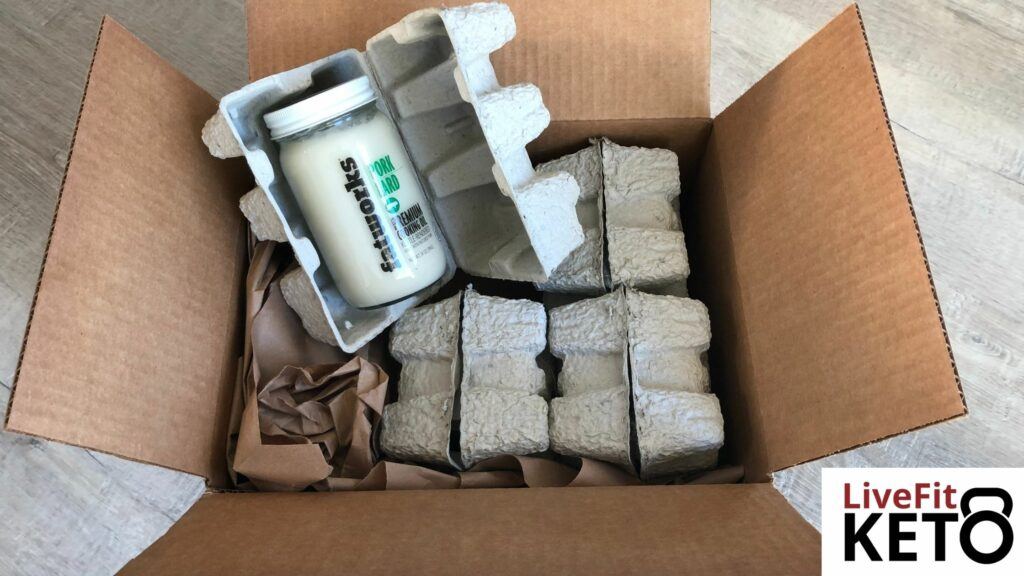
Grass-fed beef tallow, and pasture raised pork lard and/or duck fat are great cooking oil options for adding a little flavor to your food. Animal based fats are extremely nutritious, and very stable at moderate to high heat. They contain a healthy amount of omega-3 fats, and are very versatile.
Our top recommended brand for tallows, lard, and duck fat is Fatworks. These products are available on Amazon, but they tend to be cheaper if ordered directly from Fatworks.
Palm Oil
Many restaurants and food product manufacturers have turned to palm oil as an inexpensive substitute for trans fats which have been banned in many areas. Even though it is less expensive and has similar nutritional benefits as other oils, it still hasn’t become a home kitchen staple like coconut oil or olive oil.
Palm oil production has caused devastating environmental damage, and although there are some sustainable sources, it is a hard reputation to rebound from. If you prefer to use palm oil, or have a recipe that specifically calls for palm oil, we recommend Nutiva organic, non-GMO, cold filtered, unrefined, fair trade, Ecuadorian Red Palm Oil.
Avocado Oil
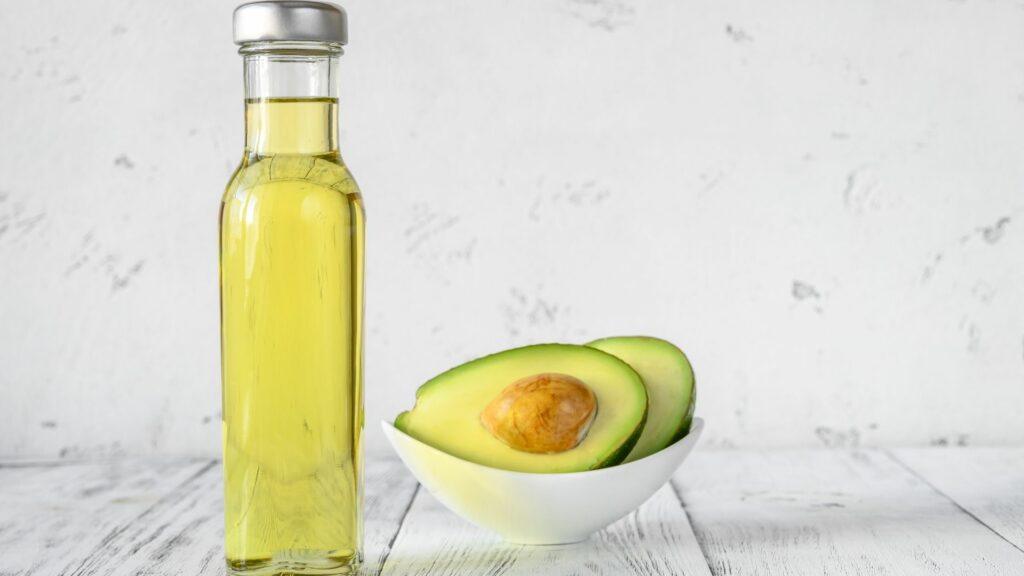
A study recently published in the Journal of Food Control exposed several issues associated with the freshness and purity of several avocado oil products. Of the 22 domestic and imported avocado oil samples tested from online and grocery store brands, 82% were either rancid or mixed with other oils, even if they were labeled as “pure” or “extra-virgin” avocado oil.
Three samples labeled as “pure” actually contained 100% soybean oil, and six other samples contained large amounts of sunflower oil, safflower oil, and soybean oil. Experts have suggested that loose or lagging regulations for newer products like avocado oil has made it easy for companies to apply false labels to their products.
Within the study, only two brands were found to be pure and still fresh by the expiration date: Chosen Foods 100% Pure Avocado Oil, and Marianne’s Avocado Oil.
Which oils do you prefer to cook with? Please consider sharing your experience by commenting below in order to help others living a fit keto lifestyle.
Thank you for visiting LiveFitKeto.com. Check back often for new content or subscribe to our newsletter to receive updates on new articles, and if you have found this information helpful, please don’t hesitate to share.



